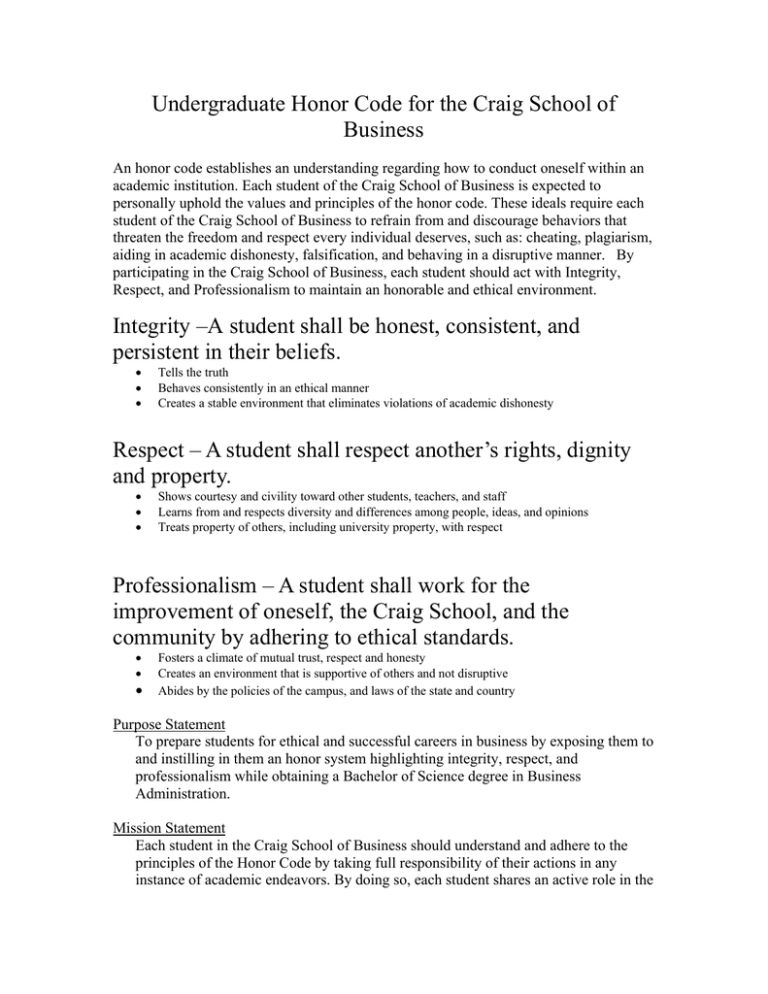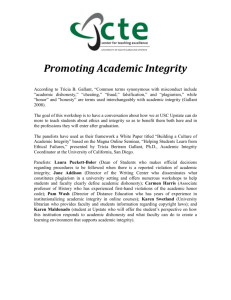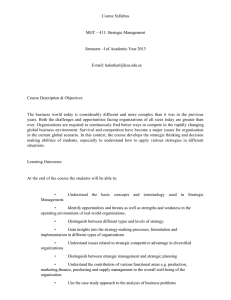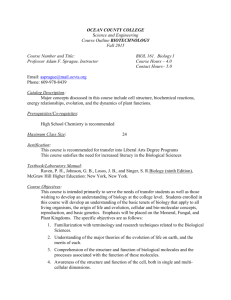Undergraduate Honor Code for the Craig School of Business
advertisement

Undergraduate Honor Code for the Craig School of Business An honor code establishes an understanding regarding how to conduct oneself within an academic institution. Each student of the Craig School of Business is expected to personally uphold the values and principles of the honor code. These ideals require each student of the Craig School of Business to refrain from and discourage behaviors that threaten the freedom and respect every individual deserves, such as: cheating, plagiarism, aiding in academic dishonesty, falsification, and behaving in a disruptive manner. By participating in the Craig School of Business, each student should act with Integrity, Respect, and Professionalism to maintain an honorable and ethical environment. Integrity –A student shall be honest, consistent, and persistent in their beliefs. • • • Tells the truth Behaves consistently in an ethical manner Creates a stable environment that eliminates violations of academic dishonesty Respect – A student shall respect another’s rights, dignity and property. • • • Shows courtesy and civility toward other students, teachers, and staff Learns from and respects diversity and differences among people, ideas, and opinions Treats property of others, including university property, with respect Professionalism – A student shall work for the improvement of oneself, the Craig School, and the community by adhering to ethical standards. • • • Fosters a climate of mutual trust, respect and honesty Creates an environment that is supportive of others and not disruptive Abides by the policies of the campus, and laws of the state and country Purpose Statement To prepare students for ethical and successful careers in business by exposing them to and instilling in them an honor system highlighting integrity, respect, and professionalism while obtaining a Bachelor of Science degree in Business Administration. Mission Statement Each student in the Craig School of Business should understand and adhere to the principles of the Honor Code by taking full responsibility of their actions in any instance of academic endeavors. By doing so, each student shares an active role in the foundation of the honor code by strengthening the morale and reputation of the Craig School of Business. Procedures for Violations If the student violates the standards of the Honor Code, he or she will be referred to the Dean or Associate Dean of the Craig School of Business, which may lead to action up to and including expulsion or suspension from the Craig School of Business. University policy will be followed which may also result in additional disciplinary sanctions through Student Affairs. Violations of Academic Dishonesty The foundation of the academic environment can become unstable if the following acts of academic dishonesty take place: Cheating: The actual or attempted practice of fraudulent or deceptive acts on coursework and examinations for the purpose of improving one’s grade or obtaining course credit and achieve an unearned academic advantage over other students. In addition to the attempted act of cheating, any evidence of intent to cheat is also interpreted as cheating. (All material on cheating taken from the Universities Policies and Procedures) Examples of cheating include (but are not limited to): y Looking at or copying from another student’s test during an exam period y Stealing or arranging for the theft of an exam. y y y y y y y y y y Using lecture notes, textbooks, learning aids, or electronic devices during an exam when prohibited Having someone else take an exam in your place Utilizing a calculator and/or other learning aids not expressly allowed by the instructor Storing, receiving, and/or accessing course subject matter in a calculator, pager, cellular telephone, computer, or other electronic device that can be used during an exam period without instructor authorization. Obtaining assistance in answering questions on a take-home or online exam, when such action is specifically prohibited. Using bribery or threats to obtain an undeserved grade Changing an answer on a graded test and claiming the students response to the question was incorrectly marked wrong Submitting a report under the student’s name that the student did not compose Depending upon others to complete laboratory assignments or homework when instructors call for independent work Sabotaging someone else’s laboratory work or other exercise Plagiarism: The misuse of the words, or ideas of others by misrepresenting the material by implying that is it your own work. Examples of plagiarism include (but are not limited to): y y Copying whole sections, paragraphs, or sentences and including them in your work with out properly citing them Submitting ideas or phrases within a report that are taken from another person without citing or giving credit to him/her Aid of Academic Dishonesty: Intentionally facilitating any violation of the honor code. Examples of aiding of academic dishonesty include (but are not limited to): y Allowing another student to copy from your test paper. y Employing signals to indicate answers on an exam to others. y Taking an exam in place of someone else y Sharing test questions with students in another section of the course y Giving your returned exam to another student preparing to take a makeup test y Transmitting electronically to another student information stored in or sent via a calculator, pager, cellular telephone, computer or other electronic device during an exam period without instructor’s authorization y Helping others answer questions on take-home exams when such assistance is specifically prohibited y Permitting another student to copy your work y Writing a paper for another student y Providing substantial research assistance to another student for writing a report y Assisting others on laboratory assignments or homework, when the instructions called for independent work y Allowing others to copy the write-up of your laboratory work or homework Falsification: The fabrication, distortion and misrepresentation of data. Examples of aiding of academic dishonesty include (but are not limited to): y Obtaining an equal share of credit for group work, even though little or no contribution was made y Lying about the reason for not submitting a report on time y Submitting the same report for two or more courses without consent y Inventing, exaggerating, or lying about data or information Violations of Behavior Disruptive Behavior: Conduct (in speech or in behavior) that disrupts the learning process, and damages the integrity of the learning environment. Examples of disruptive behavior include (but are not limited to): y Physically or verbally abusive conduct y Interruptions y Inappropriate use of electronic devices during class including answering cell phones, emailing on laptops, and playing games on PDA’s. y Failure to adhere to the instructor’s rules or instructions y Vulgar or obscene language, slurs, and other forms of intimidation through speech or attire. Acknowledgements: The Honor Code Committee would like to thank Robert Hernandez and fellow committee members for the use and adaptation of their “Statement of Values.” Some material has been modified and taken from: the Cheating and Plagiarism, and Disruptive Behavior policies at Fresno State, Codes Governing Student Conduct in the California State University, and Executive Order No. 628 Student Disciplinary Procedures for the California State University. Additional information regarding these policies can be found at the following website: http://studentaffairs.csufresno.edu/discipline/index.html Honor Code Agreement I have read and understood the Undergraduate Honor Code for the Craig School of Business. Sign__________________________________________ Date________________






